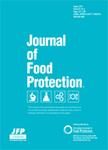版权所有:内蒙古大学图书馆 技术提供:维普资讯• 智图
内蒙古自治区呼和浩特市赛罕区大学西街235号 邮编: 010021

作者机构:Armour Swift Eckrich Prod Dev Lab Downers Grove IL 60515 USA
出 版 物:《JOURNAL OF FOOD PROTECTION》 (食品保护杂志)
年 卷 期:1999年第62卷第7期
页 面:766-772页
核心收录:
学科分类:0832[工学-食品科学与工程(可授工学、农学学位)] 08[工学] 0836[工学-生物工程]
主 题:梭菌属/分离和提纯 肉/微生物学 家禽产品/微生物学 火鸡 动物 牛
摘 要:Certain types of commercially produced noncured turkey breast and roast beef are precooked in situ, stored at 4 degrees C or below, and typically given use by dates of greater than 50 days. While of rare, sporadic occurrence, an unpleasant spoilage characterized by strong H2S odor and gas production has been observed in these products. This spoilage is due to the growth of psychrotrophic anaerobic sporeformers. Isolates from roast beef resemble Clostridium laramie while isolates from uncured turkey have been designated C. ctm for cooked turkey meat. The turkey breast isolates were characterized by temperature growth ranges, carbohydrate fermentations, and other biochemical reactions. Growth of all isolates was inhibited in broth media by 3.0% NaCl, 100 ppm nitrite, 2.0% sodium lactate, or 0.2% sodium diacetate. Inoculated studies were performed with three isolates in cooked turkey product. All three isolates grew and spoiled product at 10 and 3.3 degrees C, and one isolate grew at 0.5 and -3 degrees C. Some differences in growth were observed with the lactate and diacetate treatments in turkey meat among the three isolates. One isolate appeared to utilize the lactate, two were inhibited. Overall, 0.1% diacetate consistently delayed growth, although to different degrees, for all isolates.